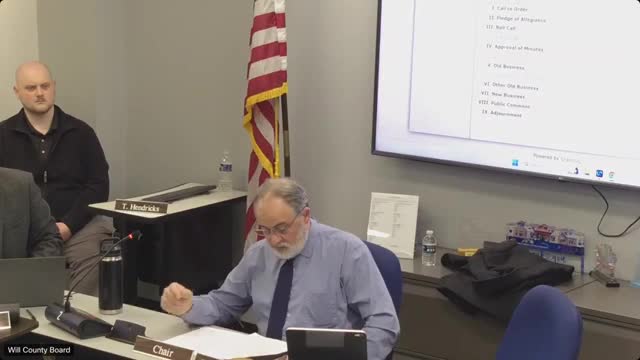Will County ad hoc committee forwards recommendation to expand Access Will County, including a rideshare pilot
Get AI-powered insights, summaries, and transcripts
Subscribe
Summary
An ad hoc Will County committee voted to forward a package of recommendations to the county executive committee that asks the county to explore expanding Access Will County services, fund a transportation enhancement account and study limited use of rideshare (Uber/Lyft) to shorten waits and serve cross‑township trips.
The Will County Access Transportation Ad Hoc Committee voted to forward a set of recommendations to the county executive committee on Friday that would ask county leadership to support enhancements to Access Will County, create a transportation enhancement fund and study limited use of rideshare services to reduce long wait times and provide trips across township lines.
The recommendation — moved from the ad hoc committee and adopted on a roll‑call vote — asks the executive committee to consider a $288,000 transportation fund (described in the draft as allowing a $1,000 monthly contribution to each enrolled township) and to explore cost‑sharing arrangements with townships and riders to cover supplemental rideshare trips. Committee members repeatedly emphasized that the draft is a recommendation, not a binding ordinance or appropriation, and that the executive branch and the normal budget process would decide any actual funding.
The recommendations are aimed at two gaps committee members said the existing regional programs have not solved: long return waits for some riders (committee members cited examples of waits that can stretch to hours) and the inability of some residents to book trips that cross township borders. "These are recommendations from this committee to go to the executive committee," Chair Trip Butler said during debate. Butler described the document as a framework for the executive office and transportation staff to refine, not as a final funding plan.
Elaine, identified in committee discussion as county staff working on the program, told members that "Willride was the historical name of our dialer ride system that operate[d] on the eastern portion of the county. We have rebranded. We are now Access Will County." Elaine also emphasized the county would not force townships to participate: "I will never force a township. We would never force a township to be involved in this program."
Committee members debated several specific numbers and implementation details in the draft. The document as discussed included a $288,000 fund figure and language describing monthly allocations of $1,000 to townships enrolled in the program; proponents described $5 per‑ride and other cost‑sharing illustrations during discussion but acknowledged those figures were a framework and might change after further study. Members also raised that existing budget lines have previously funded transportation — one committee member said last year the item was funded at about $200,000 and that some county funding for the program this year was discussed as near $300,000 — and several members urged that any new funding go through the regular county budget process.
Committee members repeatedly recommended that participation be voluntary for townships. Members from several townships said their local programs already negotiate terms with Access Will County or regional transit partners such as PACE; panelists said PACE and other regional operators are already exploring limited rideshare use but face constraints such as variable rideshare availability and driver shortages in less densely populated areas.
The motion forwarded to the executive committee asked that the governing body "reaffirm its commitment to promoting local, efficient and personalized transportation solutions that enhance community connectedness, bolster economic development, and prioritize the well‑being of all residents in Will County," request quarterly status reports to the County Board, and include study of integrating rideshare services to reduce wait times and serve cross‑township travel. The committee recorded the measure as approved on a roll call.
Members asked the executive committee and county staff to return with more detailed cost estimates and implementation plans, and several speakers urged that any proposed tax or county budget increases be carefully vetted through the normal budget process rather than by committee recommendation alone. The ad hoc committee’s work will now be reviewed by the executive committee, which has sole authority over whether to adopt funding changes or programmatic expansions.
The committee dissolved its immediate business after the vote; members who pressed for additional follow‑up asked for quarterly reports back to the County Board so elected members can monitor any proposed changes as the executive office refines the plan.
